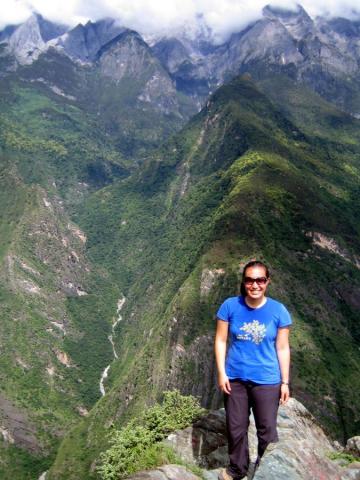Welcome to the BRC's Students & Alumni Spotlight page! Read on below to learn more about the diverse experiences, exceptional research, and personal journeys of students and alumni affiliated with the Biodiversity Research Centre. Explore the collection of interviews, illuminating the unique perspectives, research endeavors, and contributions of our community members. Explore their exciting discoveries, academic pursuits, and the profound impact of their work within the vibrant realm of biodiversity and ecological studies. Join us in celebrating the remarkable achievements and diverse paths of these inspiring individuals connected to the BRC.
Interested in sharing your experiences on the Alumni Spotlight page? Contact Ben Scheufler for more information.
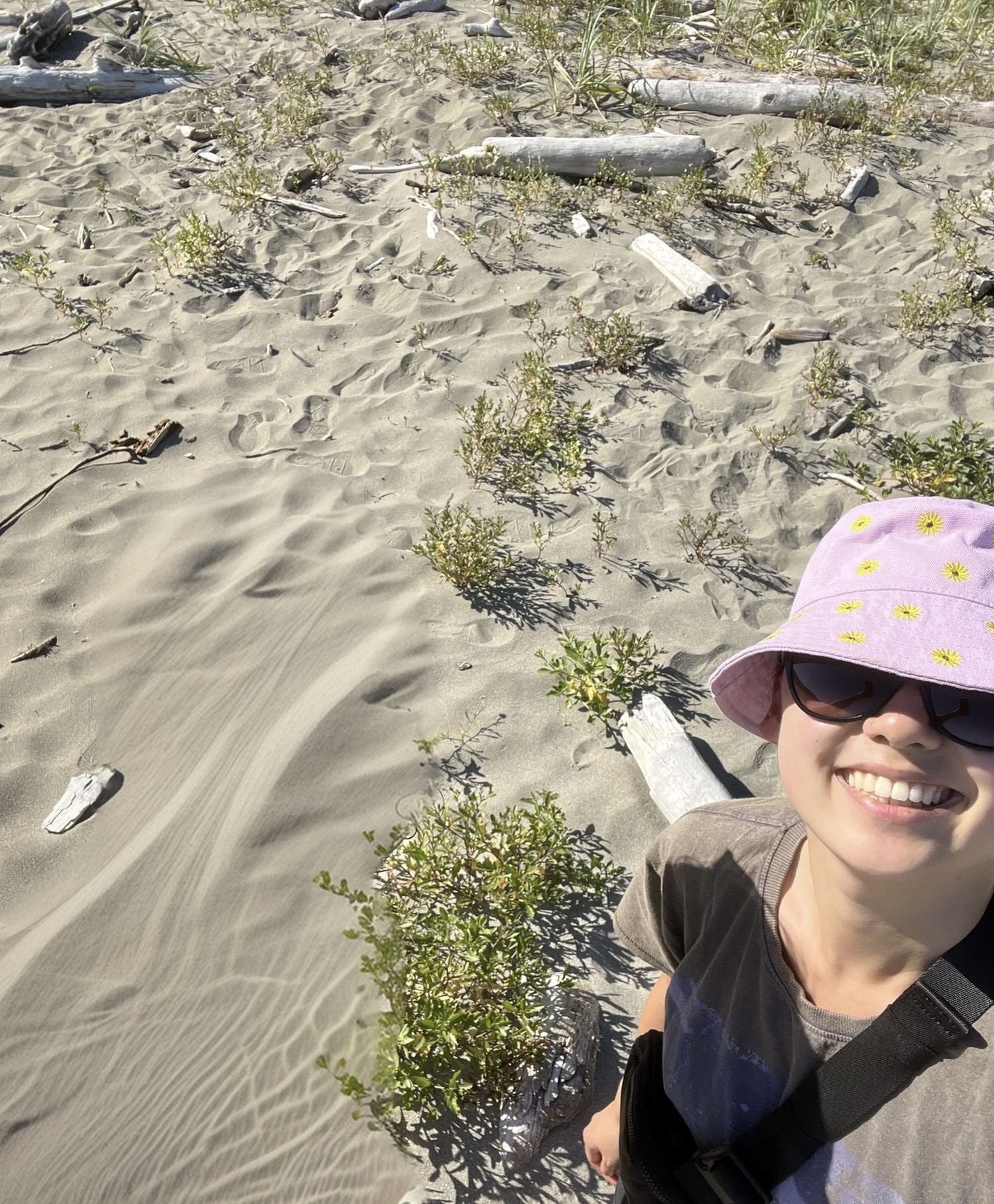
February 2025: Amy Kim
Amy is a graduate student at the UBC Biodiversity Research Centre whose research focuses on the evolution of invasive searocket species and the genetic mechanisms behind species hybridization and replacement. She uses a mix of field studies, greenhouse experiments, and bioinformatic tools to explore how invasive plants adapt and spread. In addition to her research, Amy is a committed teacher and mentor, supporting undergraduate learning and helping guide fellow TAs through training and professional development. She also plays an active role in equity and inclusion initiatives within the Botany community. Grounded by a love for local ecosystems, Amy finds motivation in the diversity of life she encounters on the coast and in the forest, and in the shared effort to build a more inclusive scientific community.
Read Interview
What are your primary responsibilities at the BRC?
As a graduate student, my first and foremost responsibility is my research and my thesis. This consists of greenhouse and field experiments, lots of lab and computer work from processing samples from the field to bioinformatics, and constant reading and writing. I am also a TA for BIOL 180 and BIOL 415, which I love doing. For these classes, I grade, help develop lecture material and activities, lead tutorials, and support students in their learning journeys. My responsibilities at the BRC, also consist of being a member of the Botany EDI Committee (BEDI), supporting the Botany Graduate Student Association (BGSA), being a TA coordinator and facilitator for the TA Development and Advancement (TADA) program in biology and a botany peer mentor. I also believe that as a member of the BRC, and a member of the science community, it is everyone’s responsibility to create a welcoming and inclusive space for students, researchers, staff, etc., from all walks of life. Therefore, I feel strongly about advocating for the needs of our community and creating programs and resources to better support our community members.
Can you briefly summarize the focus of your research?
I study invasive species evolution on two hybridizing invasive species called European searocket (Cakile maritima) and American searocket (Cakile edentula). This system is quite interesting, as we see a parallel pattern of introduction, hybridization, and eventual replacement of one species by the other in several parts of the world. I use common garden experiments, field studies, and molecular and bioinformatic techniques to determine evolutionary mechanisms underlying biological invasions such as interspecific hybridization and introgression and reductions in genetic load. I hope that my research can inform conservation efforts and management in invasive species and advance the knowledge of invasive species evolution.
What’s been the most memorable experience from your time in the lab?
The most memorable experience has been working with my undergraduate students in the field and lab. I love seeing how invested they become in the project and how excited they are when they learn something new, from planning an experiment, collecting samples and data in the field and greenhouse, to extracting DNA in the lab. It is also so rewarding and satisfying to learn about their aspirations and goals in school and life and see them grow and achieve those goals. Some have gone on to grad school, or are currently applying, and some have gone on to jobs in the science industry, and I feel so happy that I was able to support them in some way in their journey.
In your own words, what does biodiversity mean to you?
Biodiversity means, to me, the complex, interconnected relationships of diverse organisms that create a resilient and beautiful community. It means to me, the diverse plants and fungi I see when I take a walk in Lynn Canyon or Pacific Spirit Park, it is the abundance of algae and creatures scattered along the coast when I walk along the shores of Vancouver Island, and all the organisms I find when I kneel down to look in a tidepool or wade in the water. It is all the things that bring me joy when I am exploring outside, and it is what motivates my research.
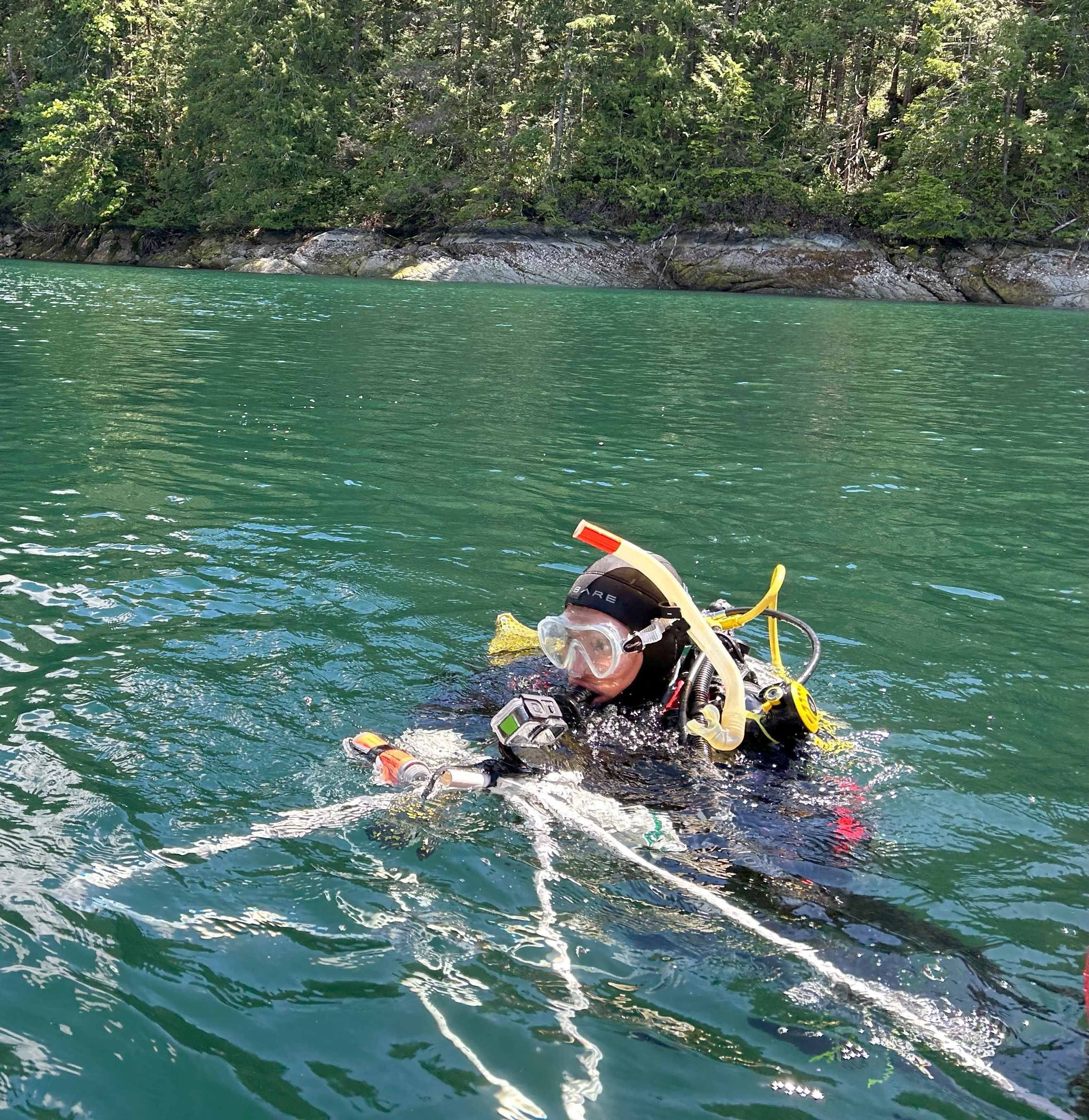
December 2024: Raisa Ramdeen
Raisa, a graduate student at the UBC Biodiversity Research Centre, researches seagrass adaptation genomics to support eelgrass restoration and improve understanding of climate resilience in marine ecosystems. Her work combines fieldwork, including scuba diving, lab-based DNA sequencing, and bioinformatics analysis. Passionate about fostering an inclusive Botany community, Raisa advocates for graduate students and supports peers from the Global South. Inspired by hands-on conservation efforts and the interconnectedness of life, she is deeply committed to biodiversity and its role in sustaining our planet.
Read Interview
What are your primary responsibilities at the BRC?
My main responsibility is organizing and executing my research project for my degree. This includes field work such as scuba diving to collect samples, working in the lab to extract DNA for sequencing, and desk work involving statistics, bioinformatics, reading and writing. This also comes with other commitments such as joining lab meetings, attending seminars and supporting the BGSA (Botany Graduate Student Association). Additionally, I am happy to contribute to building an inclusive Botany community by advocating for the needs of graduate students and building a program to support students from the Global South.
Can you briefly summarize the focus of your research?
I study seagrass adaptation genomics. For my first project I am studying the species commonly called eelgrass (Zostera marina), in its Pacific range - the aim is to better understand how different eelgrass populations will withstand climate change. I am hoping to support eelgrass restoration practitioners with more information to be able to identify vulnerable populations for restoration, and healthy, resilient populations for selecting outplants (plants selected to be used to restore degraded seagrass meadows). I also plan to expand my research to study climate adaptation of tropical seagrasses.
What’s been the most memorable experience from your time in the lab?
While I was getting trained in scientific diving, as divers in training, we volunteered with the Marine Life Sanctuaries Society. They do very interesting community work where they host field trips for young Indigenous students – it was inspiring to see how the educators and students used the coastal landscape as an open “classroom” to learn a variety of topics and skills. The MLSS also has a rockfish conservation program, and it was great to contribute by conducting monitoring surveys while scuba diving.
In your own words, what does biodiversity mean to you?
Biodiversity is all the ways life can exist and co-exist, sometimes in unimaginable ways. And, well, on a personal note, biodiversity is meaningful to me because I feel most grounded and at peace when I have the chance to be surrounded by wildlife – whether diving a coral reef, or taking a forest bath. This is the reason I have devoted my career to research serving conservation needs. The term biodiversity is also, to me, a reminder that we (humans) are not separate from nature.
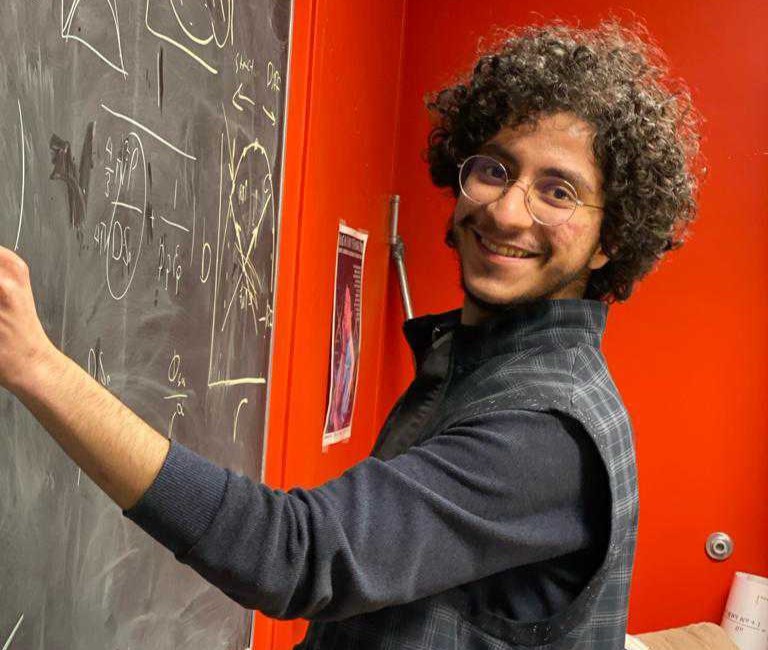
December 2023: Javad Meghrazi
Javad, a graduate student at the UBC Biodiversity Research Centre, is dedicated to exploring how species adapt to environmental changes and stressors. In addition to his own research, which focuses on social evolution and adaptation costs in fluctuating environments, Javad actively participates in the BRC community as a teaching assistant and a key support for the BRC seminar series. He values the collaborative environment at the BRC, often engaging with colleagues across disciplines to gain insights and share ideas. Driven by a deep concern for biodiversity loss, Javad’s passion is to contribute to sustainable solutions and a better understanding of our planet’s ecosystems.
Read Interview
What are your responsibilities here at the BRC?
Alright, so I'm a graduate student, I think my first responsibility is just to do my research and do my thesis. Pretty much every semester, I TA a course. I’ve TA’d Biostats, evolutionary biology and biomathematics, which are kind of related to what I do. I'm also in charge of setting up AV for the BRC seminar series! I don't have many other responsibilities, but I enjoy and I think feel responsible to talk to people in different Labs. I really like to talk with everyone about their science and try to like be connected with them. I feel like there is a lot that we can learn from just talking to one another.
Your research spans a variety of scales, from big questions about evolution to the microbiology of kefir - In your own words, what research areas or big questions are you really passionate about?
I'm really interested in knowing what will happen to a community when Climate changes. For example, the temperature is increasing or some variable is changing, and that's where it starts when you’re in community college. But I don't like to start there. I'm like, okay, no, we need to first understand interactions of the species. So I'm interested in Social Evolution like before that one level lower. Basically that's what I did for my thesis, like how can we think about cost of adaptations, when an organism is adapting to changing environment, let's say higher temperature, or like higher presence of stressors. How would they adapt to become resistant to a stressors? My thesis particularly was about role of food quality and environment suitability. Like for example if we have two populations one of them is in an environment with good food and everything is great, and the other is in an environment where food is scarce, which one is more likely to evolve stress tolerance adaptations. And so yeah, I kind of started from there, in my thesis I focused on cells and cost of adaptations in cells and how that cost depends on environment quality, but I’m also interested in scaling up and thinking about interactions, of like how organisms evolve when they are in a mutualistic interaction, or a parasitic interaction or a symbiotic interaction of any sort. So that’s something I’ve been reading about more these days, I haven’t really done work on it but yeah. I’m interested in all of that.
What has been the coolest experience you’ve had while working on your research with the Otto Lab?
Once, I was presenting lab meeting. And so I had this 40 minute talk and it was basically the very first time that I had the idea of my thesis, like the logic behind it. And I wanted to present it to the lab and I used this metaphor to explain it, which was about, what is the optimum? Say I have a friend, Ali, who is my lab mate. Imagine he finds apples and Javad makes apple pies with the apples, what is the optimum ratio of Ali’s and Javad's? And like that was a really fun experience. Like it was 40 minutes talking about the optimum ratio of Ali’s and Javad’s. Yeah. And that was really the very basis like that maybe the first step in doing my thesis which I'm like really excited about cool.
So over the course of your career, you've traveled from Tehran to Vancouver for your research. What have been kind of some of the big defining decisions that have led you down your career path?
When I finished high school, I knew that I didn’t want to go down the med school route, because that’s like a decision that you make after high school in Iran. I knew that I was interested in science and environmental issues, but there’s not a good ecology program in Iran. So I studied biotechnology in Iran, which was a biology/engineering program, which was nice, it provided me with a lot of background in mathematics and helped me be more comfortable with this stuff. Then when I was applying to Canada, I was like okay, I like ecology, evolution, microbiology, my interests are really broad. It’s kind of unfortunate, but I really want to get out of Iran. So I wrote to 200 profs, and I got lucky because the only one that worked out was Sally Otto. I didn’t really realize who Sally is, and how amazing and helpful she is, until like a year into my degree. Which was an experience to leave, and to see how she is shaping my direction.
That’s a phenomenal amount of work you put in, to email 200 professors!
The most difficult part was to follow up with all of them because they don't respond to your emails. Yeah. Like every couple of days I was sending reminders to all of them.
So now that you're here what are your what would you say are some of your favorite aspects of being in the Biodiversity Research Center?
I think one thing that is unique about the Biodiversity Research Centre, in comparison to other departments and UBC or everywhere: I think it's this great community, where there are these cool things like discussion groups that we have like the BDG and like, seminars, and there is a lot of opportunity to socialize with everyone and get to know them and like talk with them about their science. I feel like people are pretty chill, so it's not a competitive environment. People are willing to share their ideas and like, trust each other, which is a great opportunity to learn. I think people really try to have a nice work life balance. There are always these other fun activities that people do, or Wellness initiatives. There are there is a lot to do. I never get bored of it, or get bored of talking to people.
What does biodiversity mean to you?
I think it's just sad when I think about the idea of like coral, reefs bleaching and things going extinct. I feel like, it’s emotional. Just the idea of something going extinct, is really touching for me, and that motivates me where I'm like okay if I want to contribute to something I think this is a good area like I really care about this. And we have to manage to find the way of living sustainably on this planet. So that kind of motivates me to want to work around these kinds of questions.
Thank you so much, Javad!
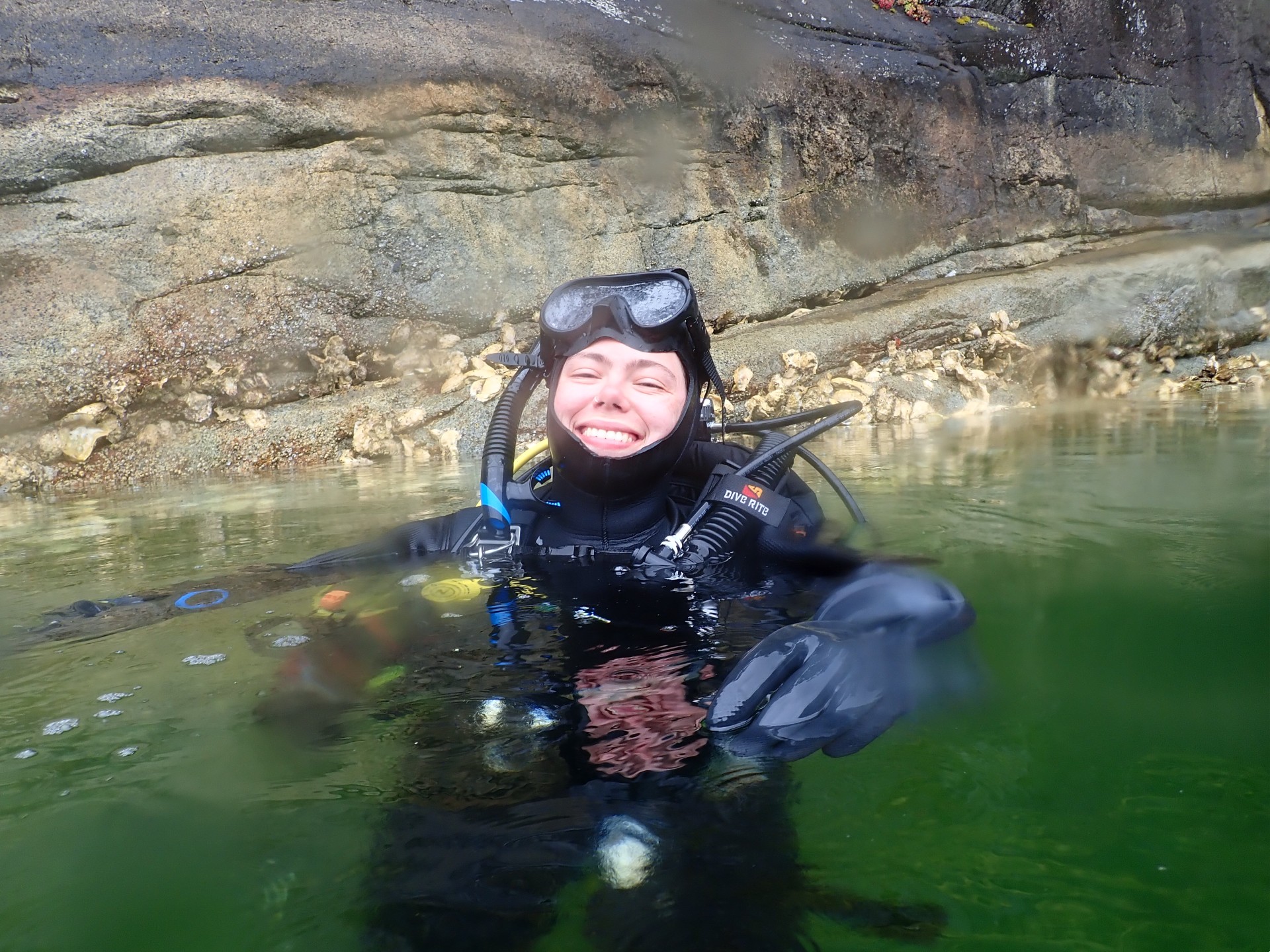
More Pictures
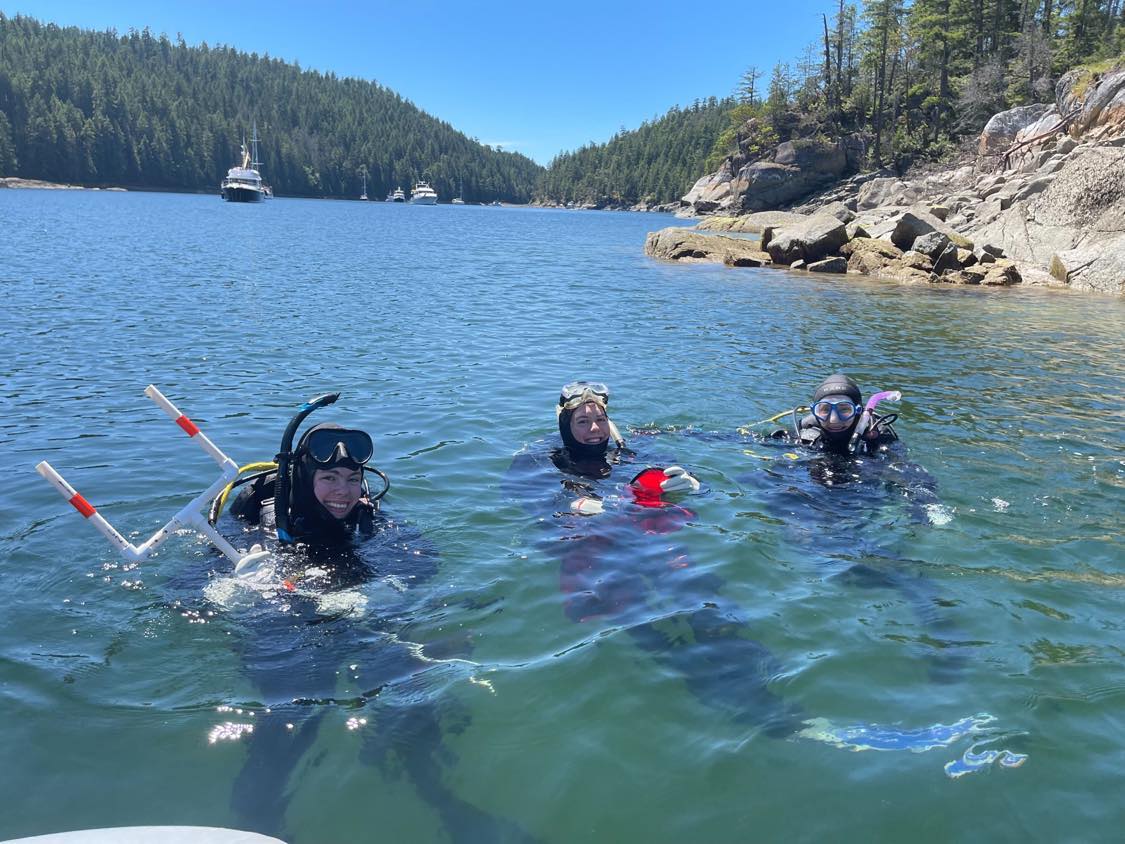
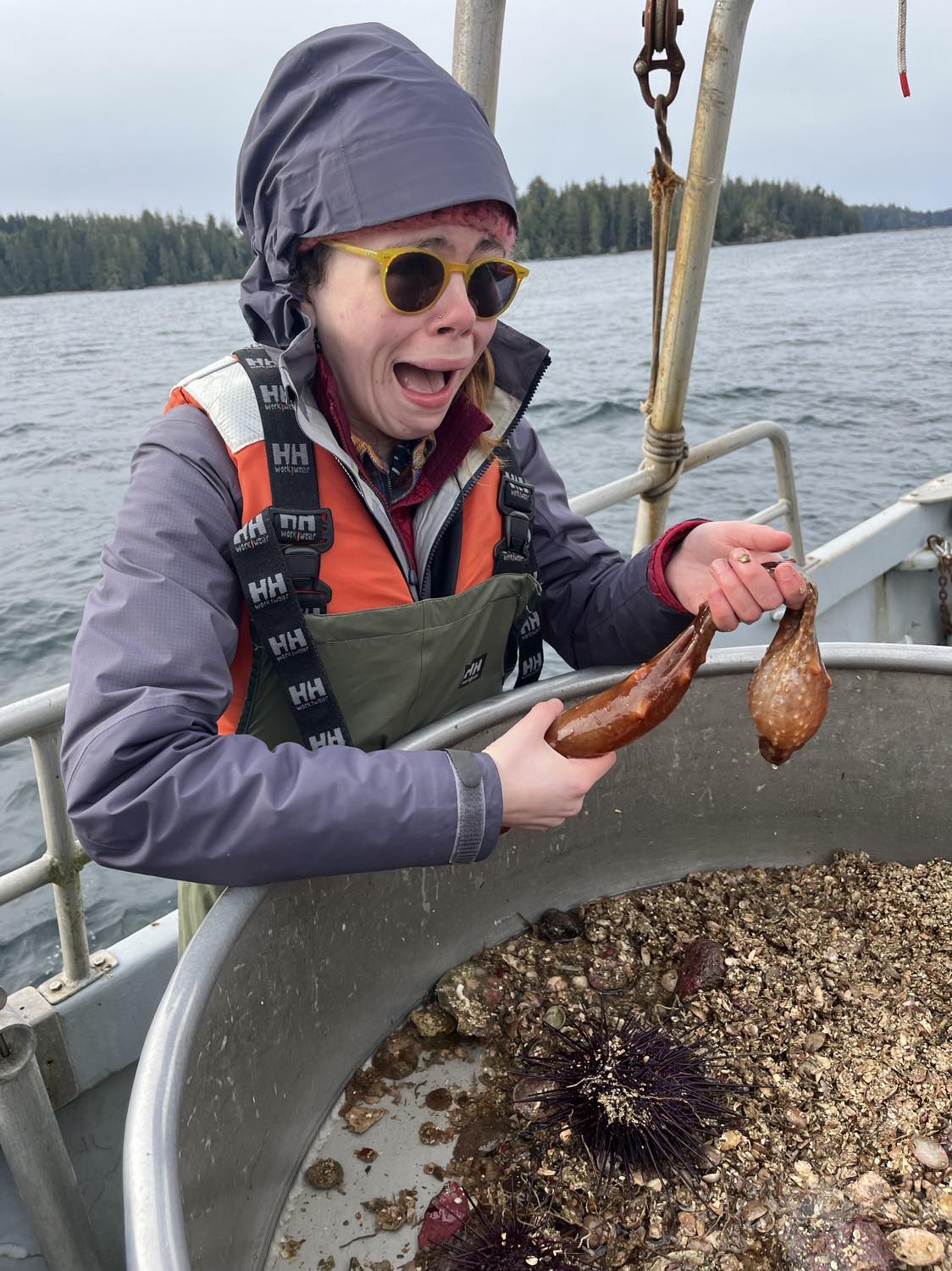
November 2023: Maggie Slein
Maggie is a graduate student specializing in marine ecology at the Biodiversity Research Centre. Her primary research involves investigating the impacts of temperature on ecological processes, particularly in marine ecosystems, exploring the thermal variability and asymmetry between biological processes in anemones. With a strong background shaped by a stint working in an aquarium, her passion for ocean stewardship fuels her scientific pursuits. A highly engaged member of the BRC, Maggie revels in the collaborative and open scientific community the Centre embodies, reflecting her efforts in multiple roles like treasurer of the Zoology Grad Student Association, union representative, and GSS counselor. Find out more by reading the interview below!
Read interview
What are your responsibilities at the BRC?
"Well, I'm a grad student, so I guess my biggest responsibility is my degree. But in the broader BRC community, I'm the treasurer of the Zoology Grad Student Association. I'm also our union rep for zoology. I'm also our GSS counselor. I don't really know where else. Yeah, a load of activities, all over the place."
From a quick look at some of your publications, it looks like your research covers a pretty wide range of topics, from looking at the effects of climate variation on biological processes to increased accessibility of open science to students. In your own words, what research areas or big questions are you really passionate about?
"That's a great question. Broadly, my scientific work is all about temperature effects on ecological processes. The first paper of my PhD is all about thermal variability and how organisms mitigate that differently. But I'm a marine ecologist by training, so I'm really interested in how that influences ocean processes and marine ecology food webs. I'm doing some work with anemones to kind of uncover the thermal asymmetry between different biological processes.
And then the other paper, which is not published yet (but I love it no less), is from a working group that I did my first year, a CIEE funded group. Which I guess is the other thing I could have said in my responsibilities in the BRC — I participated in BRC cluster grant working group on the heat dome. That's still not published but will be eventually."
What has been the coolest experience you’ve had while working on your research with the O’Connor Lab or otherwise?
"The O'Connor lab is the Jack of All Trades, yeah. So, we kind of all do everything. I think the coolest stuff I've done is very tangential to my degree, but I got to do fieldwork up in Desolation Sound doing eelgrass habitat biodiversity surveys, scuba diving. So I would say that's the coolest."
You’ve traveled from Portland to Vancouver for your research, what have been some of the big, defining decisions you’ve made that have guided your path through academia so far?
"I feel like I'm a really stubborn person, so I kind of... I'm stubborn and I'm very set on whatever it is that I want to do, and I've been like that for a long time. Long story short is that I started doing research in high school, and then after that I just was like, ‘I'm going to do research.’ So, I went to an undergrad where I could do research and then I just kind of... I met Mary [O’Connor] my second year of undergrad, so I was like, ‘Mary is really cool, I wonder if I could do work in her lab.’ And I actually tried to come here during COVID. I had a whole seagrass project that was going to come up and go diving, and then COVID happened."
But you did get to dive eventually.
"Yes, because I am very stubborn. So, I feel like just following things that you feel passionate about, that is like the through-line to here. I feel like just a walking PSA for the New England Aquarium, because I was in an ocean stewardship program. So, I always feel like I'm always a steward. Everything I do is as an ocean steward. But yeah, I think everyone has their own version of that."
Did you have an experience when you were little that really drew you to marine ecology?
"My dad was in the Coast Guard, so I feel like I spent a lot of time on boats and around the ocean on the coast. Then in my first year of high school, I was a real keener. I wanted to work at the aquarium and then I did that for four years doing education, and then animal husbandry. And so I was like, 'Yeah, this is it. Sounds good to me.’
Could you share some of your favorite aspects or experiences about working at the Biodiversity Research Centre? What do you enjoy most about being part of this research community?
"Wow, great question. I feel like I came from a very collaborative undergrad, but I feel like the BRC has redefined what collaboration looks like for me. Like, it's not like this in other places where you can just go to another lab and be like, ‘I would like to borrow your multi-million-dollar piece of equipment,’ and they're like, 'For sure. When do you want it? How long do you want it for? We're happy to work with you.’ I feel like that's something that's really unique but also just like the exchange of ideas.
There's so many different events and so many people that you end up talking to, opportunities for conversation. Like the working group that I was in, that was very cool. It pulled people who are all BRC members, but who are in different faculties, to kind of think about this one thing — that’s just one snapshot of the things that happen at coffee hours.
I love going to the BRC seminars. They're some of the best seminars on campus. I try to get other people to come where I'm like, ‘This is happening, you should go,’ even if they're in other departments. I feel like the BRC is, to me, the epitome of what a collaborative and open scientific community could look like, where everyone's kind of in symbiosis with each other, rather than parasitism."
What does biodiversity mean to you?
"Wow, it's the classic question, devastating. What does biodiversity mean to me? Well, the textbook definition obviously is that, the more different things you have, the better off you are in staving off any sort of chaos. Which I feel like is applicable in life, you know? If you have people who have different perspectives, different ideas, different ways of thinking about things, kind of like biodiversity is really resilience. That's it, that's all we got."
Thank you, Maggie, for joining us and agreeing to be interviewed!
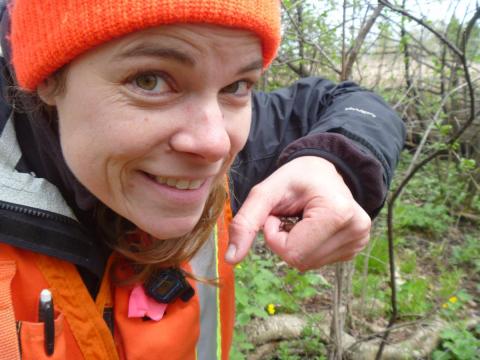
May 2015: Robin Le Craw, Ph.D.
Robin LeCraw was a PhD candidate with Diane Srivastava. At UBC, she studied the effects of spatial processes at multiple scales, from local colonization of patches to biogeographical shifts in community dynamics and function. Robin used a system of aquatic invertebrates contained in bromeliad rosettes (a tropical plant) in Puerto Rico, Costa Rica, and Brazil to examine the effects of spatial scale on predation and decomposition. Robin now works as an aquatic ecologist with the MMM Group Limited, an engineering and environmental consulting firm in Kitchener, ON. We reached out to Robin to hear about how her experiences at the BRC prepared her for her career in consulting.
Read interview
What are your responsibilities in your current position?
''I'm responsible for conducting aquatic ecosystem assessments and other wildlife surveys to develop environmental protection during projects from subdivision developments to highway construction and bridge repair.''
What advice do you have for people interested in pursuing consulting after school?
''Get as broad a base of experience as possible. Working with government, and private sectors especially, will give you more experience with the practicalities of environmental legislation and regulations than you'll likely learn in academia, and you'll learn how to work with a variety of interest groups. As a consultant you'll need to bridge input from government agencies, clients, and other consultants, and having a broad base of knowledge and experiences from which to draw is essential.''
What experiences from the Biodiversity Research Centre best prepared you for what you are doing now?
''Two aspects of my time in BRC have prepared me for this career in consulting. Building on my above advice, participating in the BRITE internship program twice gave me valuable experience working in two other fields - with the provincial government and an environmental NGO. These gave me experience working with people in different fields, and also knowledge of legislation and legal issues surrounding ecological conservation, and species at risk, which have been invaluable in my consulting role.
''Second, is the project management and collaboration experience I gained through my field program during my Ph.D. The transferable skills I gained from planning and coordinating several international field trips in conjunction with our colleagues in those countries are, I think, what got me this job. The ability to juggle several projects and manage timelines with several other staff and project managers is critical in consulting, and having the freedom and support to take on that project management during my Ph.D. was one of the most formative experiences I had at BRC.''
What, if anything, did you find challenging about moving into consulting from academia?
''Consulting is a very different beast, and there are some aspects I'm still getting used to. The collection of data is more focused on screening for sensitive aspects of the ecosystem, and there isn't a lot of need for quantitative data and statistical analyses. I miss the data and my R skills are getting a little rusty! However, there is a lot of interesting field work to be had, on a variety of project types around the province, and I still get to play outside!
I struggle sometimes with the ethical differences between working for the client, versus working for scientific advancement or for the sole purpose of ecological conservation. However, working in an applied field means that we are directly responsible for recommending and implementing measures to protect the ecosystem. We can have a more immediate impact on preserving ecosystem function, communities, and sensitive species.''
What does biodiversity mean to you?
''The amazing variety of life and their interconnections of which we are a part. The most wonder-inspiring aspect of the world.''
Any final thoughts on your time at the BRC?
''My experiences at BRC were very rewarding. There are opportunities to explore many aspects of science and biodiversity that can lead to any number of interesting career paths if you take advantage of them. I am still benefiting from my time there both in my professional life, and ongoing scientific partnerships and friendships.''
Thanks to Robin for sharing her experiences with us!
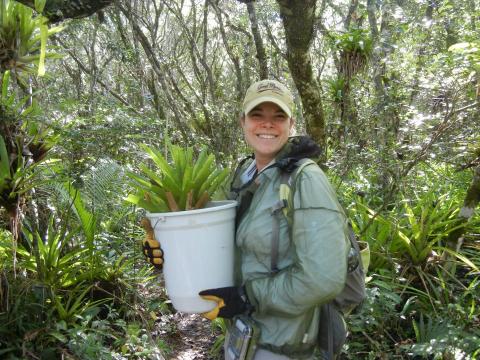
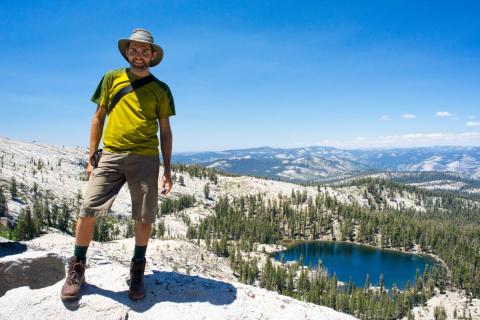
April 2015: Leithen M'Gonigle, Ph.D.
Leithen M'Gonigle was a PhD student from 2005-2011 at the Biodiversity Research Centre where he worked with Sally Otto. His work comprised two separate topics: 1) sexual selection and species co-existence (e.g., is it possible that sexual selection might enhance co-existence of species across space?) 2) antagonistic host-parasite co-evolution (can host-parasite interactions affect the long-term evolution of hosts or parasites in terms of other traits like mutation rate or is it just how "parasitic" they are?). We caught up with Leithen as he begins his transition to an assistant professor position at Florida State University.
Read Interview
What was the best experience you had as part of the Biodiversity Research Centre?
"I loved my whole experience there so much! I would have to say that the overall collegial atmosphere at UBC was really the highlight for me. As a student working largely on theoretical projects, I spent a lot of time on campus at my desk and it was so great to be surrounded by such a great group of students/post-docs/faculty. The amazing seminars, dinners with speakers, discussion groups, and parties really made it one of the best times of my entire academic career!"
What resource did you find to be the most valuable during your time?
"I did a BRITE internship at the end of PhD with the Xerces Society in Portland and this was a very good eye opener for me. It also ended up getting me in the door with my post-doc advisor where I have spent the past few years, so that was definitely an amazing and formative experience for me."
What did you do right after finishing at UBC? What are you doing now?
"I headed down to UC Berkeley to do a post-doc with Claire Kremen. I'm currently in the process of transitioning from that position to a professor position at Florida State University."
What advice do you have for BRC students wishing to pursue a professor position?
"Stay at UBC as long as you can! It's such a great place and, the longer you spend there the more you'll get done before you head off to a post-doc! One thing that is also a bit shocking post-grad school is just how little time you suddenly have to learn new skills. So, my advice is to stay at UBC as long as possible and to learn as much as you can from as many people as possible while there! All those skills will be amazingly useful once you're out on your own."
What experiences or skills from your time at the BRC best prepared you for your current position?
"I learned a lot as a graduate student in the BRC. Probably, most of all, was how to be part of a collaborative group. I learned an amazing amount from my peers at UBC - everything from computer coding to manuscript writing. In particular, I think my quantitative and programming skills really served me well as a post-doc - a little R goes a long way when you're suddenly working with real data, which is something I did for the first time as a post-doc."
What does biodiversity mean to you?
"Biodiversity to me is simply the sum of all species in a given place. And the most interesting question, in my mind, is understanding both how this diversity came into existence and, even more than that, what forces enable it to persist."
Check out Leithen's website to learn more about his research!
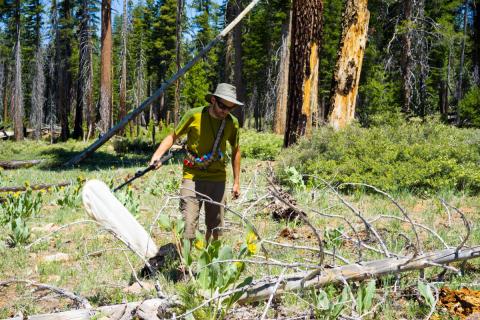
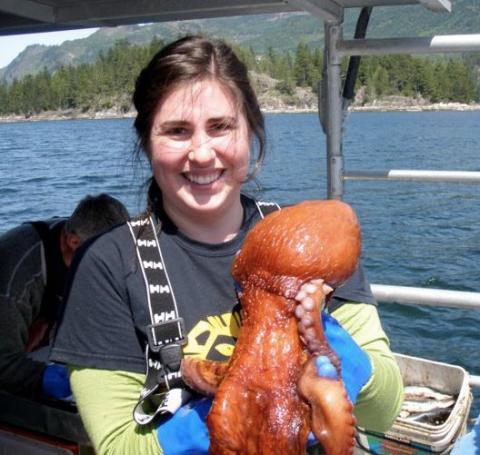
February 2015: Roya Eshragh, M.Sc.
Roya Eshragh recently completed her Masters with Brian Leander here at the Biodiversity Research Center. Roya explored the fascinating evolution of dicyemids, a little known parasite of cephalopods. We were able to catch up with Roya while she is in Madagascar to hear about her adventures after graduate school.
Read Interview
What projects have you been involved with after finishing your degree?
"Since the BRC, I did some contract work for the British Columbia Conservation Association and taught as a sessional lecturer at UBC. Now I am the Senior Science Officer at ReefDoctor, a marine conservation NGO in southwest Madagascar."
What experiences or skills from your time at the BRC were most beneficial for your current position?
"Learning how to set up projects, and how to adapt to unexpected situations was invaluable. Being surrounded by world-class scientists showed me how good science is done and now allows me to bring high standards of data collection and analysis to any project I undertake. In my current position, I am in charge of surveys and monitoring a bay ecosystem and can use my experience and what I was exposed to in the BRC to expand and perfect the science program."
What BRC resource did you find most valuable during your time in school?
"Seminars were really useful to learn what the world of biology is doing, and what is considered good science. They showed aspects of ecology and evolution that I never would have contacted with my research alone."
What was the best experience you had as a part of the BRC?
"I think I'm going to have to choose the huts skits (a yearly parody skit featuring a variety of faculty from the Department of Zoology). Both participating in and watching them were hilarious memories that always make me smile."
What advice do you have for current BRC members?
"Make use of everything you possibly can. Never again in your life are you going to have such easy access to such an abundance of high quality lectures, friendly and helpful experts, an entire museum below you, and a melting pot of intelligent people with unique ideas and solutions."
What does biodiversity mean to you?
"Biodiversity is what makes the world interesting. It's the interaction of all organisms fulfilling separate niches working together for a functioning ecosystem. When parts start to die and the niches go unfilled, the whole ecosystem suffers."
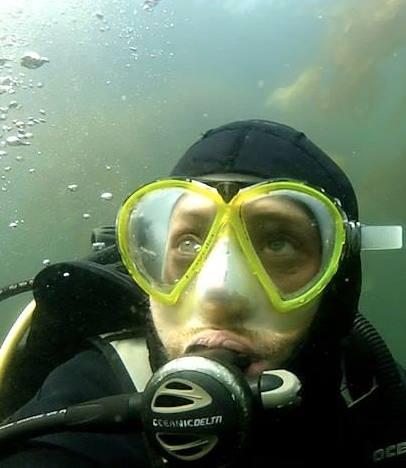
January 2015: Ross Whippo, M.Sc.
Ross Whippo studied the community ecology of near-shore marine habitats during his master's degree with Mary I. O'Connor at the Biodiversity Research Centre. Ross was interested in the assembly and persistence of invertebrate communities in seagrass meadows. He conducted subtidal surveys using SCUBA and tested the dispersal of several common seagrass-associated organisms in Barkley Sound, BC from the Bamfield Marine Sciences Centre. We chatted with Ross to hear about his adventures post graduate school and plans for the new year.
Read Interview
What did you do after graduate school?
"This past summer I had the chance to work with researchers from Simon Fraser University at the Hakai Institute on the Central Coast as a dive technician. I assisted them with kelp forest and seagrass ecological surveys and experiments aimed at determining the impact of repatriated sea otters to the region."
What is your current position?
"Beginning this year, I was hired by the Smithsonian Institution in Maryland as a biologist for their new MarineGEO program. MarineGEO is a cross-discipline, long-term, global initiative that will employ standardized observations and experiments to build an open-source database of the world's near-shore marine biodiversity. The project will focus on exploring interactions between biological and environmental factors that shape marine ecosystems. My role is to coordinate research with scientists at partner institutions, conduct field work, and develop the methods that MarineGEO will employ at all their research sites."
What skills did you gain from your time at the BRC that are most beneficial to you now?
"There are two specific skills (amongst many!) that I developed while at the BRC that have helped me immeasurably after graduation. First, the ability to communicate effectively with other scientists regardless of their area of study, whether I am explaining my own research on marine invertebrates to them, or they are explaining the "deep phylogeny of basal angiosperms" to me. Participating in seminars and taking the time to meet with visiting researchers cannot be overestimated as a sure way to make yourself fluent in the language of science. Second, the opportunity to hone my scientific diving skills at the Bamfield Marine Sciences Centre has made me a competitive job-seeker because it has given me a niche in the field of ecology. Whether you are good at GIS, molecular analyses, Bayesian models, or some specific field technique, I found it's important to make yourself an expert at something. Having a well developed methodological 'toolbox' is a very valuable asset."
What is the most valuable resource from the BRC?
"The BRC's greatest asset will always be its people. I learned so much just by being open to those around me and taking an interest in the work of fellow researchers. The BRC really fosters a sense of collaborative learning that resulted in countless lunchtime discussions, spontaneous reading groups, and meetings with other labs. It's important not to miss those opportunities, sometimes the person working across the hall from you will have the answer to a particularly difficult research question you've been wrestling with."
What was the best experience you had as a part of the BRC?
"The time I spent at the Bamfield Marine Sciences Centre (BMSC) both as a researcher and intern will stay with me forever. Collaborating with researchers from all over the country, exploring hidden worlds under the waves, and seeing some of the most stunning biodiversity our planet has to offer are not experiences I could easily forget. If you are ever given a chance to spend time on the outer coast, jump on it."
What advice do you have for current BRC members?
"Be the first person to volunteer! I found that stepping up and giving my time and energy to others was the best way to accomplish all of my own goals. Whether those goals were personal or professional, making connections with colleagues and assisting on other projects gave me valuable insights that I never would have gotten otherwise. You never know where your next great idea will come from. Also, learn R. PIs love it when you can use R."
Finally, what does biodiversity mean to you?
"Biodiversity means connections. Those hidden pathways that form a definitive (if complex) link between me and a diatom floating in the middle of the Pacific Ocean. I can't imagine a more exciting and rewarding endeavor than bringing even a fraction of those connections to light."
Be sure to follow Ross on Twitter (@RossWhippo) as he will be tweeting the exciting research that MarineGEO is doing around the globe.
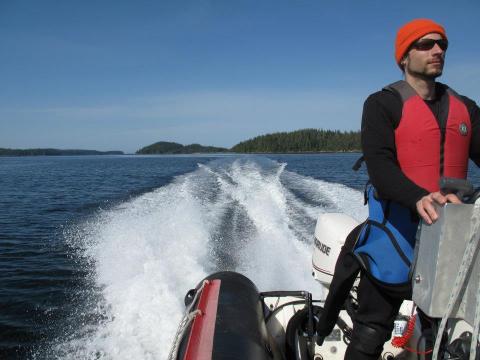
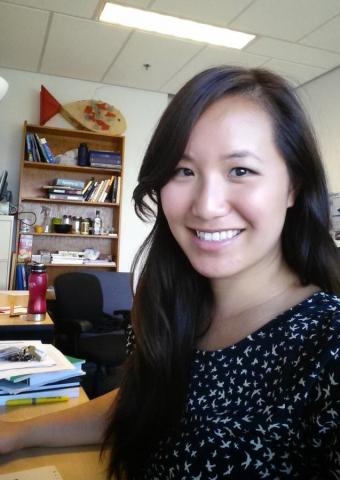
December 2014: Jessica Lu, M.Sc.
Jessica Lu got her masters degree in Botany (2013) while working in the BRC with Roy Turkington. Jessica studied plant community ecology and designed a field experiment carried out in SW China. Her experiment involved manipulating the quality and quantity of plant litter and measuring the response in soil nutrients and the detritivore community in subtropical rainforests. We caught up with Jessica to hear more about her experiences.
Read Interview
Where do you currently work?
"I currently am the Data Management Coordinator at Genome British Columbia. I work in the Research Programs group at Genome BC, where I curate the output metrics of all the projects that we fund, and maintain this data in an internal database."
What was the biggest accomplishment from your time at UBC?
"I was heavily engaged in teaching and originally wanted to pursue a teaching career after graduate studies. I was a teaching assistant for a variety of courses, as well as participating in various workshops and courses in teaching (through UBC CTLT and the Biology department). Through that realm, I became interested in science communication and the importance of communicating good science to a wide range of audiences. I started to use Twitter (@JessMLu) and to engage with the scientific communication community at UBC, and met people who I otherwise wouldn't have interacted with. Lastly, I participated in a BRITE internship with Bioversity International in Rome, where I developed an interest in the policies around data management."
What experiences or skills from your time at the BRC best prepared you for your current position?
"I am grateful that my supervisor encouraged me to go to a brand new system and helped me with experimental design and coming up with my own questions. I think that by having my own independent project, I learned to curate and organize my own data, and developed a strong attention to detail. More directly, the work I did during my BRITE internship, where I researched and documented research activities in crop genomics, gave me skills that pertain to my current job. One of my internship supervisors also acted as a reference during the interview process. I probably would not have been considered a candidate for my current position without having done the BRITE internship, let alone be selected."
What advice do you have for current BRC members?
"Say yes to collaborations, opportunities, and generally, jump with your feet first and immerse yourself into the ecology/evolution/biodiversity community at UBC. You get out of it what you put in. Don't treat grad school as something you do from 9-5pm, a lot of networking and collaborations happen in random hallway conversations."
Finally, what does biodiversity mean to you?
"To me, biodiversity represents the crazy and colourful natural world that exists all around us, and the plants and animals of all shapes and sizes, all trying to play a different role in the ecosystem."
